The Science Behind Why Eggs Are So Important For Cookies
Oh, cookies. There's nothing like a freshly baked, soft, and tender cookie warm from the oven. That first bite is just heaven. But if you've ever made a cookie from a recipe you haven't used before, and they were crumbly, fell apart, or just didn't have the right texture, there may be a reason why: no eggs were used.
A cookie is made from fat, flour, and sugar. The gluten that results from mixing water and flour makes the web that holds the whole thing together, according to King Arthur Flour. Sugar provides flavor and interferes with some of the gluten, making a more tender cookie, and it helps in browning, says The Sugar Association. And fat provides tenderness and flavor, per Imperial Sugar. Those components provide the basic flavor and structure of a cookie. But eggs also play a very important role. While some cookies, most particularly sugar cookies and shortbread cookies, are developed to not need eggs, most drop cookies do.
So what's in eggs that makes them such a good cookie ingredient?
The incredible egg
Eggs are a protein powerhouse. They also have other great qualities that make them a must in most baking recipes. The interesting thing about eggs is that the whites and yolks have different properties that work with the other ingredients in the dough to make your cookies perfect, according to The Exploratorium.
The egg yolk contains fat that helps add moisture and tenderness to the cookie; in fact, all the fat in the egg is in the yolk, per Get Cracking. The fat in the egg yolk interferes with the gluten, just a bit, so the cookies are tender. The yolk also contains protein for structure, and water, which the flour in the dough uses to form gluten, the protein that holds the cookie together. The protein in the egg yolk also helps with the Maillard reaction, the fancy name for browning, when it reacts with the sugar, according to The Incredible Egg.
The egg white has lots of protein, which helps form the cookie's structure, as well as lots of water, which not only interacts with the flour's proteins to aid the structure but evaporates in the heat of the oven, per The Exploratorium. The steam that forms helps make the cookies rise.
Now make some cookies
Now that you understand the function behind the egg's components, you can use them to your advantage. If you want a chocolate chip cookie that is tender and rich, add an extra egg yolk. Additionally, according to CIA Chef, you can use egg whites in place of whole eggs in cookie recipes with no loss of texture, appearance, or flavor. Whether or not you choose to use the entire egg or not, if you see a drop cookie recipe that doesn't call for any eggs or egg substitutions, you may want to reconsider as they very well could turn out far too dry, per The Kitchen Community.
Now that you are an egg expert, it's time to make some cookies. Make some rich and sweet chocolate chip cookies sprinkled with Maldon sea salt. Or try chewy orange almond cookies made with just egg whites. Cinnamon oatmeal raisin cookies are simple old-fashioned goodness, as are snickerdoodles. Spicy chocolate-filled peanut butter cookies are a great choice for lunchboxes. Then, for comparison, try a crumbly and sweet shortbread cookie, made ... without eggs.


